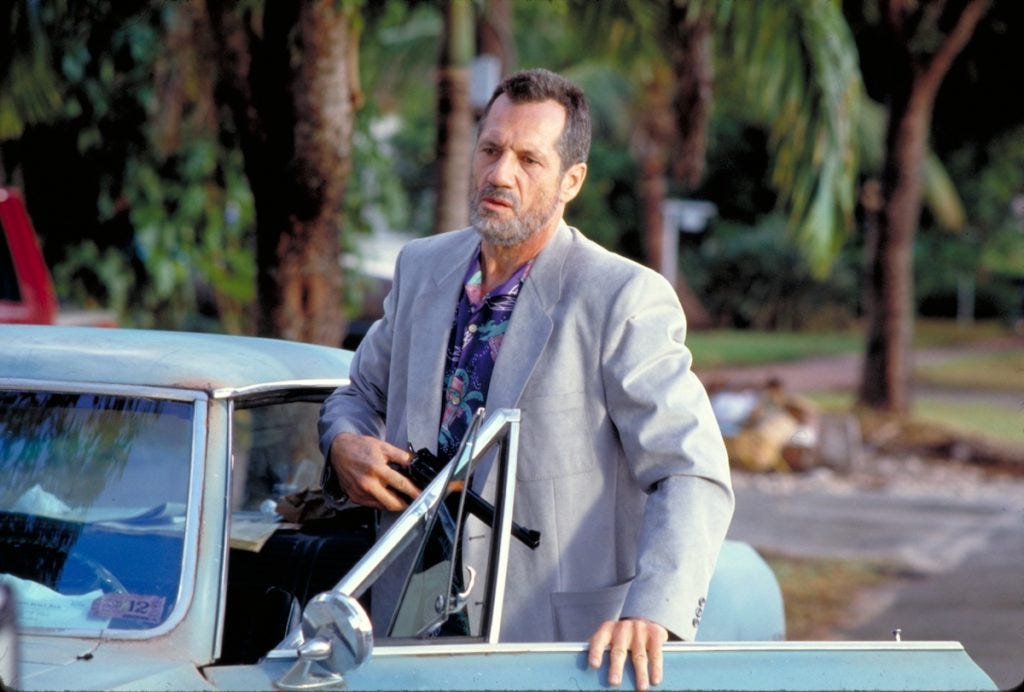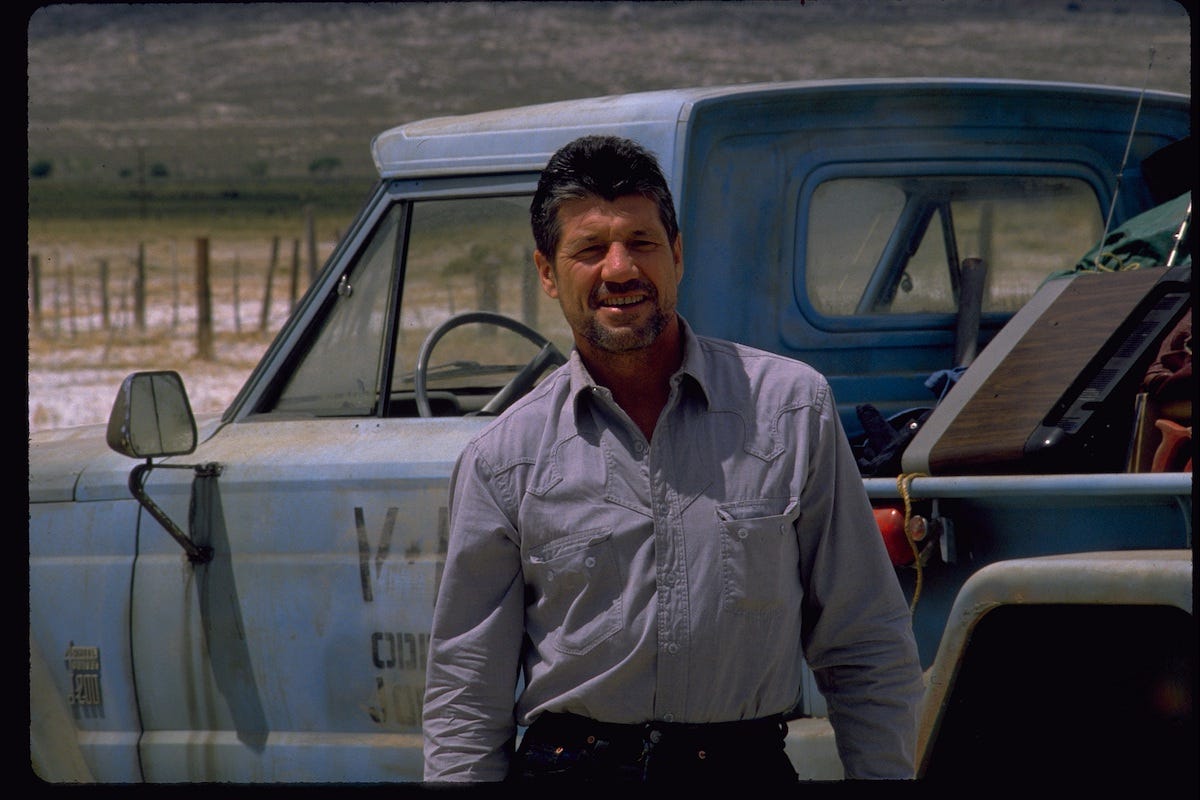While reading up on Fred Ward—the great character actor who passed away on May 8 at age 79—I learned that before he began his acting career, he’d served in the Air Force, spent time as a boxer, and worked as a lumberjack and a short-order cook. Looking at Ward’s distinct and weathered face, I can easily imagine him doing all of these things. What was rather more surprising to learn was that among his first jobs as a performer was as a mime in Rome. That’s not exactly what you’d expect from a guy whose blue-collar appearance served him so well in motion pictures. But Ward’s acting career was a long one, and he proved that he could play any number of variations on the kind of guy he seemed to naturally embody.
Fred Ward’s early acting work was filled with an array of small roles in television (including The Incredible Hulk and Quincy, M.E.), some credited, others not. His first big break was in a supporting role as one of Clint Eastwood’s cohorts in Don Siegel’s great Escape from Alcatraz (1979). Ward’s character, John Anglin, comes to the island prison somewhat late in the plot, but stokes the desire to escape that Eastwood’s Frank has been nursing the whole film. Ward plays Anglin as a guy who has spent most of his life in prison, and the only thing about it he really takes seriously is the bit where he makes, and then executes, a plan to escape. It might be worth mentioning that at this time, Fred Ward was 37 years old, and the way he looked then was pretty much how he’d look for the next couple of decades.
After Escape from Alcatraz, Ward started getting more work, including roles in Walter Hill’s Southern Comfort (1981), in which he plays one of the many National Guardsmen on weekend maneuvers in the Louisiana bayou, who, after a catastrophic accident, find themselves being stalked by Cajuns who have largely been isolated from society, and Mike Nichols’s Silkwood (1983), about the mysterious death of nuclear power whistleblower Karen Silkwood. Then, also in 1983, Ward landed his biggest part yet, as the astronaut Gus Grissom in Philip Kaufman’s The Right Stuff.
Grissom’s is one of the saddest stories to come out of the early years of the U.S. space race. In 1967, he was killed, along with two other astronauts, when a fire ignited in the Command Module during a test in the run-up to Apollo I. What makes his story even sadder is that of the original seven astronauts in the Mercury program, his trip to space is the only one that was considered a failure. This is what The Right Stuff covers (though Grissom’s death is acknowledged in a voice-over at the end), and Ward plays the humiliation and crushing disappointment felt by his and Kaufman’s version of Grissom beautifully. With the eyes of the world watching each of these historic flights (Grissom was the second to go up), the splashdown appeared to panic Grissom, leading him to blow his capsule’s emergency hatch bolts, causing it to fill with water and sink. Worse, or anyway harder for me to watch, is the moment when, after Grissom has been rescued from the ocean and brought onto an aircraft carrier, all of the cheap souvenirs he’d brought with him, with the intention of selling them at a profit because they’d been in space, come tumbling out of his pocket. Ward’s Grissom already knows his desperate claims to his angry Navy rescuers that the hatch blew through no fault of his own are not going over well (the film is non-committal as to what actually happened, and is quite sympathetic to Grissom), now has to face the awful embarrassment that his low-rent ploy to get some extra cash has been exposed.
Ward, who was a tough-looking guy, now looks pathetic, pitiful. All his dreams of glory and celebrity are done. A later scene, in which Grissom’s wife (Veronica Cartwright) comes to the awful realization that none of the rewards and glamour other astronaut’s wives enjoyed upon their husband’s return from space—that instead, she and her husband will get a hotel room with a fully-stocked refrigerator and a meek little parade; they definitely will not be meeting the Kennedys—ends in a fight between the couple. Grissom finally cracks, after doing his damnedest to make the beer he just cracked open take the place of everything else he's not getting. All the disappointment his wife is so bluntly and tearfully expressing, that he himself had been keeping locked up, comes roaring out of Ward’s mouth. It was rare to see Ward play someone at such an emotional loss, his former confidence and brashness gone in a second. Ward’s very appearance, not to mention his performance, makes it all the more poignant.

Fred Ward in 'Miami Blues'
I doubt it would surprise anyone to learn that Fred Ward was occasionally called upon to play cops and private eyes. He plays one of the latter in a very fun cable movie from 1991 called Cast a Deadly Spell. This is both a detective film and a horror film, with a focus on Lovecraftian cosmic terror (in what might be considered a too-literal choice, Ward’s character is named Harry Philip Lovecraft), and Ward seems to be having a great deal of fun appearing inthis kind of pulpy genre mash-up. More significantly, one of Ward’s best films is George Armitage’s wonderful Miami Blues (1990). Based on the first of Charles Willeford’s four novels featuring homicide detective Hoke Moseley, Ward stars opposite Alec Baldwin, playing Junior Frenger, a psychopathic ex-con who, after it’s clear Ward’s Moseley suspects him of killing a Hare Krishna, attacks the cop in his apartment, stealing his badge, gun, and, to add insult to injury, his false teeth.
Though not quite an exact adaption of Willeford’s novel, the film is an exciting, funny, dark, weird little movie that was obviously destined for the cult status it has since achieved. Ward’s take on Mosley is somewhat Columbo-esque. Check out the scene where Moseley has dinner with Frenger and his painfully naïve girlfriend (Jennifer Jason Leigh). Upon shaking hands with Frenger, Mosley notices that the other man has a hell of a grip, and later speculates, out loud, that prison is the only place a guy can develop that kind of strength. When Frenger replies, very unconvincingly, that he used to be an aerobics instructor, Ward delivers Moseley’s line “Shoots the shit outta that theory” with the kind of fake, but believable, guilelessness that evokes Peter Falk’s classic performance. It’s a blast watching Ward shamble his way through his quest to not only catch a killer, but regain his dignity. But Ward’s homicide cop isn’t bent on revenge. Ward plays him as a slightly off-beat, but essentially everyday, kind of man, who’s good at his job and is trying to do it. And while Ward never overplays the sympathy Moseley feels for Leigh’s character—in his job, he’s surely met hundreds of people like her—it comes through with admirable subtlety. It’s in his eyes, more than anything.
1990 was a big year for Ward. In addition to Miami Blues, Tremors and Henry & June were also released. Tremorsmight be Ward’s most famous film, outside of The Right Stuff. It’s a very entertaining horror-comedy, about a group of small-town Nevadans trying to survive an attack by giant, burrowing, underground sandworms (or whatever). Ward stars opposite Kevin Bacon (who is arguably the lead, but it’s close to being a tie between the two) as a pair of friends who work together as handymen in this extremely small community. The two actors share what appears to be an absolutely effortless rapport, with Ward’s Earl taking on the role of father figure, when necessary, to Bacon’s Val. They’re very funny together, playing heroes who say some pretty dumb things on occasion, but are also capable and just fun to watch. It’s one of the few horror movies that could also be described as a hangout film.
Henry & June once again paired Ward, after a seven-year interim, with writer/director Philip Kaufman. The film has a place in history for being the first to ever receive an NC-17 rating. It’s an interesting movie, though not a great one, but a decent amount of that interest comes from Ward’s portrayal of the controversial expat writer Henry Miller. It’s curious to see Ward playing a writer of high literature, but from what I know of Miller—and I mean this in terms of the man’s general demeanor, not lifestyle—if Ward was ever going to play such a writer, Miller probably makes the most sense.

Fred Ward in 'The Player'
Ward would work twice with Robert Altman in the next couple of years. First in The Player (1992), where he plays the fictional movie studio’s head of security, who knows in his gut that Tim Robbins’s studio executive is guilty of the murder the cops believe he committed. The kicker is that in Altman and writer Michael Tolkin’s bleak view of Hollywood, Ward is just as amoral as everyone else, and isn’t trying to expose a killer. Ward plays him as a guy who is just trying to cover up another scandal and protect the studio. The fact that he’s one of the smartest people in the film is immaterial.
Even better for me is Altman’s Short Cuts (1993). In that film, one of Altman’s elaborate ensemble pieces, Ward plays a regular guy who goes on a fishing trip with his friends. While fishing, they discover the naked corpse of a young woman, lodged against a rock. Reasoning that they can tell the cops about it after they’re done fishing, the do just that – they keep fishing. When he gets home, Ward’s Stuart tells his wife (Anne Archer) what they found, and she’s horrified that they didn’t immediately go the police. This drives a wedge between them, and later, at a strange, very inebriated gathering with another couple (Julianne Moore and Matthew Modine), and as certain intra-couple issues start to boil up, Ward’s delivery of the line “They couldn’t help her, she was dead” is actually fairly chilling. Ward’s character can’t possibly work out why what he and his friends did, or rather didn’t do, was so callous, almost sociopathic. And Ward’s reactions to Archer’s protests and demands to understand are perfect: frustration, saying, but not saying “Are you still on this??”
As disturbing, or historical, or even fun, as the characters Fred Ward played, he never seemed as if he was playing someone who wasn’t, fundamentally, a “normal guy.” The trick is understanding, as Ward clearly did, that “normal guys” can be, and do, all sorts of things, good, bad, and indifferent. He was a brilliant interpreter of the many layers of American male normalcy.





